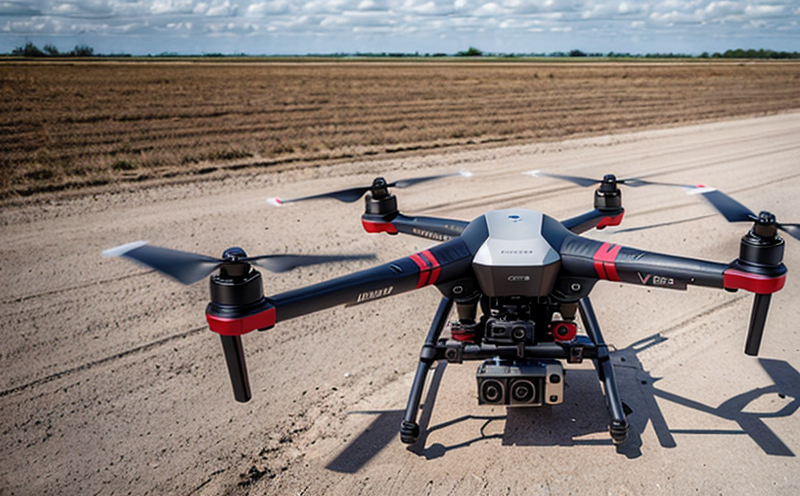FAA AC 91-57 UAV Flight Safety Testing
The Federal Aviation Administration (FAA) Advisory Circular 91-57 provides comprehensive guidelines for ensuring flight safety of Unmanned Aircraft Systems (UAVs) and drones. This service ensures compliance with these standards, which are critical to the safe operation of UAVs in the national airspace system.
Our testing approach adheres strictly to FAA AC 91-57 requirements, focusing on areas such as structural integrity, electrical systems, propeller dynamics, and overall operational safety. Each test is conducted using state-of-the-art equipment and follows internationally recognized standards like ISO 13602:2018 for UAVs.
Structural integrity tests involve subjecting the drone to various stress conditions replicating real-world flight scenarios. Electrical system checks ensure that all components function correctly under load, while propeller dynamics are analyzed using specialized software and hardware to assess aerodynamic performance and stability. These tests aim at identifying potential hazards before they become safety issues.
During specimen preparation, we carefully select the correct UAV model or component for testing based on its intended use and environmental conditions it will encounter. This precision ensures accurate results that reflect actual operational environments. Our instrumentation includes high-resolution cameras, accelerometers, gyroscopes, and other sensors capable of capturing detailed data points.
Reporting is thorough and comprehensive, providing not only pass/fail outcomes but also detailed insights into performance metrics. Compliance with FAA AC 91-57 is crucial for UAV manufacturers aiming to gain certification or approval from regulatory bodies like the FAA in the United States. This service supports quality managers, compliance officers, R&D engineers, and procurement teams by ensuring their products meet stringent safety requirements.
By adhering strictly to FAA AC 91-57 guidelines, we help our clients avoid costly delays due to non-compliance during certification processes. Our expertise in this area ensures that UAVs comply with all necessary regulations, thereby enhancing public safety and fostering trust in drone technology.
Scope and Methodology
The scope of FAA AC 91-57 UAV Flight Safety Testing encompasses several key areas. These include structural integrity tests designed to evaluate the strength and durability of UAV components under various loading conditions. Electrical system checks ensure proper functionality, reliability, and safety in power distribution systems.
- Structural Integrity Tests
- Electrical System Checks
- Propeller Dynamics Analysis
- Airframe Stability Evaluation
The methodology we employ involves rigorous testing protocols that simulate real-world flight conditions. For structural integrity tests, we use advanced finite element analysis software to predict potential weaknesses in the UAV's design. During these simulations, we apply loads equivalent to those experienced during takeoff, landing, and various maneuvers.
Electrical system checks involve a thorough examination of all power distribution components, including batteries, motors, and controllers. We ensure that these systems operate efficiently and safely within specified voltage ranges and current limits. Propeller dynamics analysis focuses on aerodynamic characteristics, ensuring optimal performance during flight.
Airframe stability evaluation assesses how well the UAV maintains its orientation and position in various wind conditions. This is crucial for ensuring safe operation in diverse environments. By adhering strictly to these methods, we provide clients with accurate assessments of their UAVs' compliance with FAA AC 91-57.
Eurolab Advantages
At Eurolab, our commitment to excellence sets us apart as leaders in UAV and drone systems testing. With a team of experienced professionals specializing in aerospace and aviation technologies, we offer unparalleled expertise in ensuring compliance with FAA AC 91-57.
We leverage cutting-edge technology and methodologies to deliver precise and reliable test results. Our state-of-the-art facilities are equipped with the latest equipment necessary for comprehensive UAV flight safety testing. This includes high-resolution cameras, accelerometers, gyroscopes, and other sensors capable of capturing detailed data points.
Our approach ensures that every aspect of UAV operation is scrutinized to identify potential hazards before they become critical issues. Compliance with FAA AC 91-57 is essential for UAV manufacturers aiming to gain certification or approval from regulatory bodies like the FAA in the United States.
We support quality managers, compliance officers, R&D engineers, and procurement teams by providing accurate assessments of their products' safety standards. Our services help clients avoid costly delays due to non-compliance during certification processes. By adhering strictly to these methods, we ensure that UAVs comply with all necessary regulations, enhancing public safety and fostering trust in drone technology.
Frequently Asked Questions
- FAA AC 91-57 compliance is recognized by other aviation authorities worldwide, including EASA (European Union Aviation Safety Agency).
- This recognition ensures that UAVs certified in accordance with FAA AC 91-57 can be operated internationally without additional testing.





